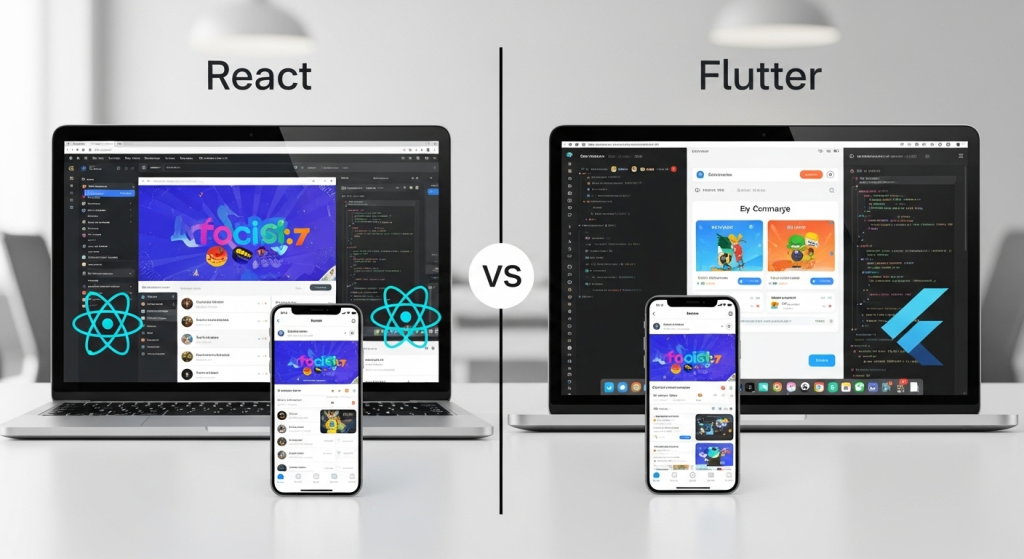
Introduction
Choosing between React (React Native) and Flutter for cross-platform app development is a common dilemma. Both frameworks allow developers to build apps for iOS, Android, and the web using a single codebase.
But which one is better?
✅ React Native (by Meta) – Uses JavaScript/TypeScript
✅ Flutter (by Google) – Uses Dart
In this 1000+ word comparison, we’ll analyze:
✔ Performance
✔ Development Speed
✔ UI/UX Flexibility
✔ Community & Ecosystem
✔ Job Market & Future Trends
1. Overview: React Native vs Flutter
A. What is React Native?
- Developed by: Facebook (Meta)
- Language: JavaScript/TypeScript
- Architecture: Uses a bridge to communicate with native modules
- Used by: Facebook, Instagram, Airbnb (formerly), Uber Eats
B. What is Flutter?
- Developed by: Google
- Language: Dart
- Architecture: No bridge – compiles to native ARM code
- Used by: Google Ads, Alibaba, BMW, eBay
2. Performance Comparison
| Factor | React Native | Flutter |
|---|---|---|
| Rendering | Uses native components | Uses Skia engine (custom rendering) |
| Speed | Slower due to JavaScript bridge | Faster (direct compilation) |
| Animations | Good, but needs optimization | Superior (60fps smooth animations) |
| Startup Time | Slower (depends on JS engine) | Faster (AOT compilation) |
Winner: 🏆 Flutter (Better performance, smoother animations)
3. Development Experience
A. Learning Curve
- React Native: Easier for JavaScript/React developers
- Flutter: Requires learning Dart (similar to Java/JS)
B. Hot Reload
- Both support hot reload, but Flutter’s is more stable
C. UI Components
| Framework | UI Components |
|---|---|
| React Native | Uses native components (varies by OS) |
| Flutter | Custom widgets (consistent across platforms) |
Winner: 🏆 Flutter (More consistent UI, better widget library)
4. Popularity & Community Support
| Metric | React Native | Flutter |
|---|---|---|
| GitHub Stars | 115k+ | 158k+ |
| Stack Overflow | More Q&A | Growing fast |
| Job Market | More jobs (legacy apps) | Rising demand |
Winner: 🏆 React Native (Larger community, more jobs)
5. App Size & Optimization
| Framework | App Size (Basic APK) |
|---|---|
| React Native | ~20MB |
| Flutter | ~8-10MB |
Winner: 🏆 Flutter (Smaller app size, better optimization)
6. Which One Should You Choose?
✔ Choose React Native If:
- You already know JavaScript/React
- You need third-party integrations (e.g., Firebase)
- You’re working on an existing React project
✔ Choose Flutter If:
- You want better performance & smoother animations
- You prefer a consistent UI across platforms
- You’re building a new app from scratch
7. Future Trends (2024 & Beyond)
React Native
- Fabric Renderer (improved performance)
- TurboModules (better native integration)
Flutter
- Flutter 3.0+ (better web & desktop support)
- Increased adoption in enterprise apps
Final Verdict
| Category | Winner |
|---|---|
| Performance | Flutter |
| Development Speed | Flutter |
| UI Consistency | Flutter |
| Community | React Native |
| Job Opportunities | React Native |
🏆 Overall Winner:
- Flutter (for new projects, better performance)
- React Native (for JavaScript devs, legacy apps)
Conclusion
Both React Native and Flutter are excellent choices. Your decision should depend on:
🔹 Team expertise (JS vs Dart)
🔹 App requirements (performance vs ecosystem)
🔹 Long-term maintenance

